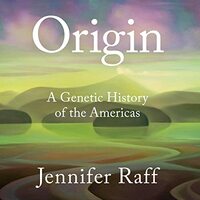Take a photo of a barcode or cover
I enjoyed this a lot and would highly recommend it. This book provides an engaging overview of the current theories about the populating of the Americas, but where it really shines is how Raff uses her anthropological background to talk about the history of how the science and research has developed, and to interrogate how and why these ideas have developed the way they have. She does not look away or shy away from the impact that racism and white supremacy has had on this history and the development of the science, and calls for and presents a clear way forward for scientists in this field to reduce harm and work with indigenous communities.
informative
mysterious
slow-paced
While I agree with other reviews that the book would have benefitted from more input from actual archaeologists, Raff nevertheless does a great job explaining the field of aDNA and it’s implications in tracing migration routes to the Americas. Occasionally dry but ultimately interesting and well researched.
This book vocalizes the deep feelings of shame all of my millennial anth professors contained in their heart.
Raff's perspective is super valuable and important, but I think she should have let the science speak more for itself. I feel like she never succeeded in the balance between her own anxieties about the ethical quandaries of her field and the actually scientific/historical aspects of the book. Everything she's saying is spot on but I could have skipped some of the internal anguish.
Raff's perspective is super valuable and important, but I think she should have let the science speak more for itself. I feel like she never succeeded in the balance between her own anxieties about the ethical quandaries of her field and the actually scientific/historical aspects of the book. Everything she's saying is spot on but I could have skipped some of the internal anguish.
Fabulous book, and a must-read for scientists, or for anyone who works with Native/Indigenous people, in any field, not just anthropology or history.
informative
reflective
medium-paced
challenging
informative
slow-paced
The substance is there, and the more archaeological examples the better, I say. However, I’m not a huge fan of the narrative style and I think the content is a bit disorganized. Overall a very interesting read and a great intro to America’s genetic history via the archaeological record.
challenging
informative
inspiring
reflective
medium-paced
Fascinating, in the information learned in the years since I've been in school, and more importantly in the discussion of the role of science in some really terrible wrongs, and the road forward in changing that. Refreshing to hear about research and respect in the same breath, instead of constantly treating them as opposing sides.
Also enjoyed the interview with Yvonne Russo. It's very clear this work was conducted in full collaboration with and support of indigenous communities.
4.5
I have so many thoughts about this book (all good) but for now I’m just going to say this should absolutely be required reading in education. This one book, despite its seemingly singular subject, covers a plethora of information and misconceptions about the indigenous peoples of the americas. Punches are not pulled and the field itself is not spared the scrutiny and sometimes scorn it has earned in the past. It’s a very accessible and comprehensive (in terms of what we have) overview of where we are in paleoanthropology and paleogenetics. Very rad all around. Both the audio and text versions are stellar. Don’t be intimidated by the subjects, the author worked very hard to make sure anyone who picks up this book can follow the current arguments and theories in the field.
I have so many thoughts about this book (all good) but for now I’m just going to say this should absolutely be required reading in education. This one book, despite its seemingly singular subject, covers a plethora of information and misconceptions about the indigenous peoples of the americas. Punches are not pulled and the field itself is not spared the scrutiny and sometimes scorn it has earned in the past. It’s a very accessible and comprehensive (in terms of what we have) overview of where we are in paleoanthropology and paleogenetics. Very rad all around. Both the audio and text versions are stellar. Don’t be intimidated by the subjects, the author worked very hard to make sure anyone who picks up this book can follow the current arguments and theories in the field.
challenging
informative
slow-paced




